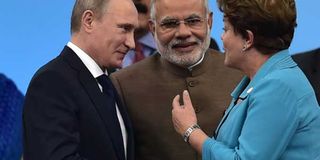Africa must create its own development dream like all other continents have done

Russian President Vladimir Putin (L) listens to Brazilian President Dilma Rousseff (R) as India's PM Narendra Modi looks on during the 6th BRICS summit in Fortaleza, Brazil on July 15, 2014. The recent launch of the New Development Bank by Brazil, Russia, India, China and South Africa (BRICS) to compete with the Bretton Woods institutions opens a new playing space in Africa. AFP PHOTO | NELSON ALMEIDA
What you need to know:
- The dilemma is in the fact that Africans have not mastered the art of converting relationships with global partners into channels to meet the continent’s core interests as the Europeans, Indians, Japanese and Chinese did.
- The Washington Consensus that promotes market-driven economies, property rights and rule of law will face off with the Beijing Consensus that entails state management of economies and self-determination.
- As an emerging monolith, Africa must establish an inclusive consensus-driven style to pick leaders who can drive the region’s interests.
Africa is living the dreams of other civilisations. In the absence of a well-crafted centre of gravity – a set of African ideas and values – the continent is being tossed left and right in the sea of geopolitical interests.
Having interacted with various global players, seen what has worked or failed to work for them, Africans have a unique opportunity to craft their own growth trajectory.
Cross-pollination of ideas that accrue from interacting with different civilisations has contributed to successful economies. The case has not been different in Africa.
Africa gained from its interaction with Europeans to craft modern nation-states. The east coast of Africa gained from its interaction with Arabs to craft the rich culture of over 300 million people who speak Kiswahili.
Africa should build on such gains to evolve a system to manage the fluid geopolitical landscape.
Persuaded by the continent’s potential to play a key role in economic progress and attracted by its abundant natural resources, vast arable land and potential market, global powers are docking on its shores.
The decision by the US to host over 50 African Heads of State is not accidental. China has been treating Africa as one entity after every three years, and other players are joining the trend.
The dilemma is in the fact that Africans have not mastered the art of converting relationships with global partners into channels to meet the continent’s core interests as the Europeans, Indians, Japanese and Chinese did.
History offers templates that Africa can tweak for its own strategy. Arabs visited the east coast of Africa armed with Islam and the bao board game that offers wisdom on how to capture, secure and invest.
The Europeans came armed with Christianity together with the poker and chess games. A poker winner is determined by the ranks, combination of their cards and what they are able to hide to the end of the game.
Chess is a game of ‘checking’ a ‘mate’ and ‘capturing’ through long-term positioning and tactical manoeuvres.
REGULATED BY POWER
At least 600 years after Zheng Khe’s voyages, the Chinese are visiting Africa armed with the Confucius philosophy and the wieqi game.
If the earth were flattened into a board game, one would likely notice Western and Eastern (mostly Chinese) games playing out with an in-built conscious and deliberate strategy, while Africans play a reactive and peripheral role.
The recent launch of the New Development Bank by Brazil, Russia, India, China and South Africa (BRICS) to compete with the Bretton Woods institutions opens a new playing space in Africa.
The unfolding world order is likely to witness stiff competition between the Washington Consensus vis-à-vis the Beijing Consensus.
The Washington Consensus that promotes market-driven economies, property rights and rule of law will face off with the Beijing Consensus that entails state management of economies and self-determination.
Tanzania’s Prof Mwesiga Baregu, argues that the use of the “village” and “jungle” imageries has decisive implications for Africa’s choice of strategy.
A village is a low-risk space that is largely inclusive and caring. A jungle is a high-risk space that is hostile and regulated by power as opposed to rules.
SHORT-TERM MINDED
External actors coming to Africa have successfully clothed their intentions using the global village mentality. Having surrendered the task of addressing the continent’s challenges to outsiders, the creative intellectual capabilities of Africans have been submerged.
To reverse this state of affairs, Africa, must domesticate processes used to identify its leaders. After 50 years of independence, the leadership structure has largely spawned short-term minded “gate-keepers” who safeguard external interests.
As an emerging monolith, Africa must establish an inclusive consensus-driven style to pick leaders who can drive the region’s interests.
The continent’s leaders’ quest to focus on productivity, food security, health, security and economic development should not exclude the need to whip their own citizenry to drive such processes.
Investment in youth is urgently required. Africa enjoys a demographic dividend estimated at 60 per cent of the continent’s one billion people aged below 25. It is foolhardy to expect them to drive the future of Africa without teaching them how to do it.
Mr Shikwati is founder-director of Inter-Region Economic Network and publisher of the online magazine, The African Executive. ([email protected])




